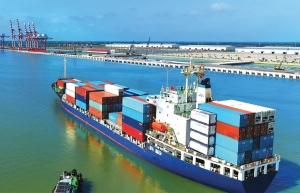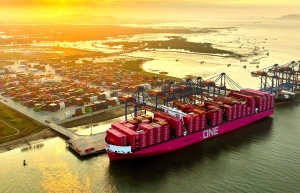Import-export taxes a lever for integration
Import-export taxes are a significant source of government revenue. As trade volumes rise, revenue from these taxes has made a considerable contribution to the national budget, ensuring financial resources for public investment, infrastructure development, and social welfare. Although this revenue share is gradually decreasing due to tariff reductions in trade agreements, such taxes continue to support the state budget during this economic restructuring phase.
 |
| Nong Phi Quang, deputy director Import-Export Tax Department General Department of Customs |
Furthermore, import-export taxes serve as a tool for regulating international trade activities. Through customs policies, the government can adjust the trade balance, encourage or restrict the import of certain goods to protect domestic production, control quality, and minimise economic risks. For instance, preferential export tax policies for strategic products have played a role in promoting exports and expanding international markets.
Through effective tax management, the government can foster the development of key industries, encourage the adoption of high-tech solutions, and promote green and sustainable production. Tax incentives for importing raw materials and machinery for industrial production have helped businesses reduce costs and improve production capacity.
Import-export taxes are not only a financial tool but also a lever for Vietnam’s deeper integration into the global economy, while simultaneously achieving sustainable economic development goals. Going forward, further enhancing tax management will be key to boosting competitiveness and leveraging opportunities in the globalisation process.
Tax management plays a vital role in ensuring government revenue, stabilising the economy, and strengthening national financial management capacity. Import-export taxes are not only a direct source of income but also indirectly promote economic development, protect domestic production, and regulate international trade activities.
Taxes from import-export goods are a direct source of government revenue. According the General Department of Vietnam Customs (GDVC), by the end of November, total revenue from such activities reached $16 billion, or 102 per cent of the target, a 14.8 per cent increase compared to the same period last year.
This is a notable achievement, especially amid global economic challenges and geopolitical fluctuations. Effective management has improved the quality of this revenue by enhancing inspections, monitoring, and applying IT to facilitate trade and prevent tax evasion.
However, tax management in import-export also faces challenges such as trade fraud, improper customs valuation, and exploitation of tax exemptions. According to reports from the GDVC, in the first 11 months, customs authorities discovered and handled nearly 16,400 violations, with the value of the goods involved estimated at over $1.2 billion.
With the aim of enhancing administrative procedure reforms and modernising customs work to facilitate trade and import-export activities, cooperation with banks to implement 24/7 electronic tax payment systems and testing payment systems via intermediary service providers is expected to ensure taxpayers can pay their taxes anytime, anywhere.
Furthermore, applying international standards and modern customs procedures ensures the smooth facilitation of business activities while maintaining strict oversight in accordance with legal regulations. Customs authorities are also committed to ensuring national budget revenue through close monitoring of sources, researching solutions to increase revenue, preventing losses, and assessing the impact of international integration commitments.
The management of tax arrears is another focus. Customs authorities aim to address arrears by classifying and handling debt categories, implementing measures to enforce collections, and reducing outstanding taxes while periodically publishing lists of businesses with tax debts to prevent new arrears from accumulating.
To enhance the effectiveness of state management, it is essential to strengthen information collection, identify risk indicators, and take appropriate measures for checks and oversight. Post-clearance audits are critical for identifying violations, fighting smuggling, and controlling trade fraud. Customs authorities will focus on checking quantities, values, codes, and origins, ensuring that no tax revenue is lost in the process.
Efforts to modernise tax management, such as the implementation of 24/7 electronic tax payment systems, applying IT in supervision, and closely monitoring trade fraud, have contributed significantly to improving budget revenue management efficiency. Simultaneously, adhering to international commitments regarding tariffs and trade ensures the protection of national interests and supports domestic businesses in integrating into global supply chains.
 | Surplus comes on back of import-export advances The domestic state budget has witnessed a surplus so far this year, reflecting a rise in revenue from export and import activities, but not from crude oil. |
 | Import-export recovery prompts maritime growth Marine transport companies delivered strong performances in the first six months of 2024, driven by a rebound in global trade. |
 | High goals set for import-export The Ministry of Industry and Trade has set a target of 12 per cent export growth in 2025 as Vietnam achieved impressive economic results in 2024, with imports and exports being the main driver of economic growth. |
What the stars mean:
★ Poor ★ ★ Promising ★★★ Good ★★★★ Very good ★★★★★ Exceptional
Related Contents
Latest News
More News
- IP alterations shape asset strategies for local investors (January 22, 2026 | 10:00)
- 14th National Party Congress: Vietnam - positive factor for peace, sustainable development (January 22, 2026 | 09:46)
- Japanese legislator confident in CPV's role in advancing Vietnam’s growth (January 22, 2026 | 09:30)
- 14th National Party Congress: France-based scholar singles out institutional reform as key breakthrough (January 21, 2026 | 09:59)
- 14th National Party Congress: Promoting OV's role in driving sustainable development (January 20, 2026 | 09:31)
- 14th National Party Congress affirms Party’s leadership role, Vietnam’s right to self-determined development (January 20, 2026 | 09:27)
- Direction ahead for low-carbon development finance in Vietnam (January 14, 2026 | 09:58)
- Vietnam opens arms wide to talent with high-tech nous (December 23, 2025 | 09:00)
- Why global standards matter in digital world (December 18, 2025 | 15:42)
- Opportunities reshaped by disciplined capital aspects (December 08, 2025 | 10:05)

 Tag:
Tag:




















 Mobile Version
Mobile Version